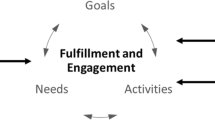Abstract
Research on wellbeing has dealt with a number of related concepts. Empirical studies can rely on two perspectives: theories about resources and theories about needs. More recently approaches combining both aspects have been introduced. Health is more easily integrated into resource theories since health itself can be considered to represent one major resource. Health can also be integrated into the theories of needs, but it has either to be regarded as an independent need of its own or as a kind of reversed need, i.e. a need to escape symptoms of illness. In contrast, social capital can be integrated without difficulties into both theoretical perspectives on wellbeing since it can either be understood as an individual or a community based resource but also as a mean by which social needs or needs related to self-realization can be fulfilled. Both the concept of wellbeing and the concept of health can further be divided according to increasing subjectivity. In the case of wellbeing the most subjective study orientation leaves it to the individual to both define the concept as well as one’s position within that dimension. In the case of health the most subjective concept is represented by measures of perceived or self-rated health (SRH). Subjective orientations, although irreplaceable, lead to challenges, since it is difficult to ascertain the uttermost validity of this type of data. The continuity and activity theories of ageing emphasise wellbeing, whereas the disengagement theory regards the decline of wellbeing in later life as a more or less inevitable development. This chapter attempts by means of a review of the literature to clarify the internal relationships of the related concepts of wellbeing and/or health research and to account for their similarities and differences.
Access this chapter
Tax calculation will be finalised at checkout
Purchases are for personal use only
Similar content being viewed by others
References
Allardt, E. (1975). Att ha, att älska, att vara. Om valfärd i Norden. [Having, loving, being. On welfare in the Nordic countries]. Lund: Argos.
Antonovsky, A. (1987). Unraveling the mystery of health. San Fransisco: Jossey-Bass.
Anderson, R. T., Aaronson, N. K., & Wilkin, D. (1993). Critical review of the international assessments of health-related quality of life. Quality of Life Research, 2(6), 369–395.
Atchley, R. C. (1989). A continuity theory of normal aging. The Gerontologist, 29(2), 183–190.
Bandura, A. (1977). Self-efficacy: Towards a unifying theory of behavioral change. Psychological Review, 4(2), 191–215.
Bourdieu, P. (1972). Esquisse d’une théorie de la pratique, précédé de trois études d’ethnologie kabyle, [Outline of a theory of practice.]. Cambridge: Cambridge University Press.
Boyle, M.H., Torrance, G.W., Sinclair, J.C., & Horwood, S.P. (1983). Economic evaluation of neonatal intensive care of very-low-birth-weight infants. N Engl J Med. 308, 1330–7.
Coleman, J. (1988). Social capital in the creation of human capital. American Journal of Sociology Supplement, 94, 95–120.
Cumming, E., & Henry, W. E. (1961). Growing old. New York: Basic.
Doyal, L., & Gough, I. (1991). A theory of human need. New York: Palgrave Macmillan.
Ferraro, K. (1980). Self-ratings of health among the old and the old-old. Journal of Health and Social Behavior, 21, 377–383.
Happy Planet Index. www.happyplanetindex.org/. Accessed July 2006.
Havighurst, R. J. (1961). Successful aging. The Gerontologist, 1, 8–13.
Johansson, S. (1970). Om levnadsnivåundersökningen. Stockholm: Allmänna förlaget.
Jylhä, M. (2009). What is self-rated health and why does it predict mortality? Towards a unified conceptual model. Social Science & Medicine, 69(3), 307–316.
Karisto, A. (1984). Hyvinvointi ja sairauden ongelma. English welfare and the problem of illness. Helsinki: Kansaneläkelaitoksen julkaisuja. M:46.
Kawachi, I., Subramanian, S. V., & Kim D. (Eds.). (2008). Social capital and health. New York: Springer.
Kobasa, S. C. (1979). Stressful life events, personality, and health: An inquiry into hardiness. Journal of Personality and Social Psychology, 37(1), 1–11.
Lehtinen, V. (1991). Suomalaisten aikuisten mielenterveys ja mielenterveyden häiriöt. [Mental health and mental disorders of the finnish adult population]. Helsinki: Kansaneläkelaitoksen julkaisuja. AL:33.
Maslow, A. (1968). Toward a psychology of being (2nd ed.). New York: Van Nostrand Reinhold Company.
Nussbaum, M. C. (2000). Women and human development. Cambridge: Cambridge University Press.
Nyqvist, F., Forsman, A. K., Giuntoli, G., & Cattan, M. (2013). Social capital as a resource for mental well-being in older people: A systematic review. Aging and Mental Health, 17(49), 394–410.
Parsons, T. (1952). The social system. London: Tavistock.
Purola, T. (1971). Sairaus sosiaalilääketieteellisenä käsitteenä. [Illness as a socio-medical concept.]. Sosiaalilääketieteellinen Aikakauslehti. Finnish Journal of Social Medicine, 3, 3–11.
Putnam R. D. (2000). Bowling alone: The collapse and revival of American community. New York: Simon and Schuster.
RAND 36. (2013). www.rand.org/health/surveys_tools/mos/mos_core_36item_terms.html. Accessed Oct 2013.
Sen, A. (1980). Equality of what? In Mc. Murrin, The tanner lecture on human values, (Vol. I, pp. 197–220). Cambridge: Cambridge University Press.
Sheline Y. I., Disabato B. M., Hranilovich, J., Morris, C., D’Angelo, G., Pieper, C., et al. (2012). Treatment course with antidepressant therapy in late-life depression. American Journal of Psychiatry, 169(11), 1185–1193.
Social Progress Index. www.socialprogressimperative.org/. Accessed 11 April 2013.
Veenhoven, R. (1984). Conditions of happiness. Dondrecht: D. Reidel Publishing Company.
Von Wright, G. W. (1986). Vetenskapen och förnuftet. [Science and reason]. Helsingfors: Söderströms.
WHO. (1995). The world health organization quality of life assessment (WHOQOL): Position paper from the World Health Organization. Science & Medicine, 41(10), 1403–1409.
WHO-QOL-BREF. (2013). www.who.int/substance_abuse/research_tools/whoqolbref/en/. Accessed Oct 2013.
www.who.int/about/definition/en/print.html/. Accessed Aug 2014.
Author information
Authors and Affiliations
Corresponding author
Editor information
Editors and Affiliations
Rights and permissions
Copyright information
© 2015 Springer Science+Business Media Dordrecht
About this chapter
Cite this chapter
Suominen, S. (2015). How to Manage with Related Concepts of Research on Wellbeing and Health – A Theoretical Review with Special Reference to Later Life. In: Nyqvist, F., Forsman, A. (eds) Social Capital as a Health Resource in Later Life: The Relevance of Context. International Perspectives on Aging, vol 11. Springer, Dordrecht. https://doi.org/10.1007/978-94-017-9615-6_14
Download citation
DOI: https://doi.org/10.1007/978-94-017-9615-6_14
Published:
Publisher Name: Springer, Dordrecht
Print ISBN: 978-94-017-9614-9
Online ISBN: 978-94-017-9615-6
eBook Packages: Humanities, Social Sciences and LawSocial Sciences (R0)




